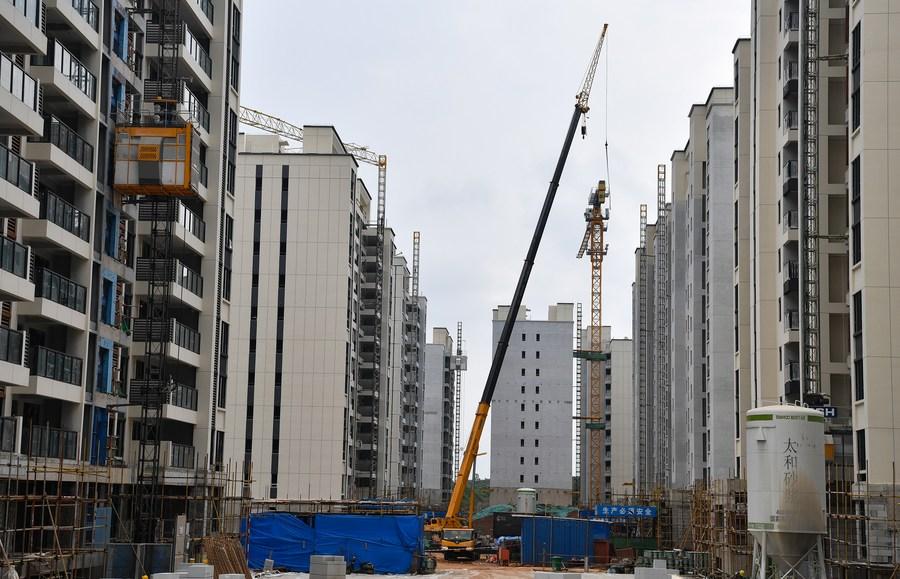Yangzhou move sets tone for realty recovery
 0 Comment(s)
0 Comment(s) Print
Print E-mail China Daily, June 27, 2023
E-mail China Daily, June 27, 2023

Photo taken on Sept. 2, 2022 shows the construction site of a residential area in Jiangdong New Area of Haikou, south China's Hainan Province. [Photo/Xinhua]
Yangzhou in East China's Jiangsu province became the first city to launch support for its housing market after the first adjustment to the loan prime rates in 10 months — and this is expected to trigger more local policy optimizations in the following months, and help stabilize the property sector, industry experts said on Monday.
Yangzhou's decision to remove restrictions on home transactions is a strong signal that more policy relaxations can be expected in the second half of the year, experts said.
"The purchase restrictions are no longer applicable for people buying properties for better living, and their previous homes can be sold without further requirements," said a notice published on the official WeChat account of the Yangzhou local government on Sunday.
The notice, effective for a year starting July 1, is tasked to promote the local real estate market's stable and healthy development.
People who buy properties for improved living conditions can sell their previous homes immediately, without having to wait for three years as was previously required, the notice said.
"Yangzhou's latest move made it the first city in recent months to scrap both caps on home purchase and sales for improved living conditions," said Yan Yuejin, director of Shanghai-based E-house China Research and Development Institution.
"Under the new policy, people seeking better homes can enjoy lower costs in terms of down payments, interest rates as well as taxes and fees. This will further drive transactions for second homes or larger apartments," Yan said.
He also said the new policy is an optimization of the city's existing measures. As early as February, Yangzhou's bureau of housing and urban-rural development issued a notification on supporting inelastic demand for improved residential living, which not only stopped home purchase restrictions, but also canceled its requirements for sale of pre-owned homes.
"This is the third time this year that Yangzhou eased policies to spur the local housing market. By extending and optimizing previous measures, the city will enjoy a better effect on accelerating the local property market recovery," said Guan Rongxue, a senior analyst with the Zhuge Real Estate Data Research Center.
Prior to Yangzhou, Fuqing of Fujian province also canceled restrictions on home sales, Yan said. "Both the cities' decisions indicate that local governments are working on policy-easing. A variety of such measures are expected across several cities in the coming months."
Real estate is one of the nation's pillar industries, accounting for about 7 percent of GDP and about 60 percent of urban household assets. Xinhua News Agency reported that an unidentified official from the Central Committee for Financial and Economic Affairs said the real estate industry has a major influence on financial stability.
Experts said along with the adjustment to loan prime rates that brought down the over-five-year LPR, on which many lenders base their mortgage rates, more supportive measures are expected to boost market expectations and deepen the property recovery.
Starting Wednesday, a number of commercial banks in Beijing, Shanghai, Guangzhou in Guangdong province, and Jiangsu province lowered interest rates for new mortgages by 10 basis points.
The move follows China's 10-basis-point cuts on June 20 to the one-year loan prime rate, the market-based benchmark lending rate, to 3.55 percent and the over-five-year LPR to 4.2 percent.
Recent cuts to the market-based benchmark lending rates sent a positive signal about economic recovery, indicating accelerated strengthening of countercyclical adjustments and triggering rising expectations for real estate policy optimization, amid increasing downward pressure on the housing market, said Chen Wenjing, director of research at the China Index Academy.
Li Yujia, chief researcher at the Housing Policy Research Center of Guangdong province, called for the adoption of measures like lowering interest rates for existing mortgages, reasonably cutting tax rates for pre-owned home transactions and reducing fees for housing transaction services.





